







POLICE NEWS
639 Murray Street, West Perth WA 6005
P (08) 9321 2155
E admin@wapu.org.au www.wapu.org.au
OFFICE HOURS
Monday-Friday 8am-4pm
AFTER HOURS
EMERGENCY DIRECTOR 0438 080 930
Follow us facebook.com/WAPoliceUnion
LinkedIn: WA Police Union instagram.com/wapoliceunion
PUBLISHED BY WA Police Union
639 Murray Street, West Perth WA 6005 (08) 9321 2155
ADVERTISING WA Police Union (08) 9321 2155
DISCLAIMER WAPU (“Publisher”) advises that the contents of this publication are the sole discretion of the WA Police Union and the magazine is offered for information purposes only. The publication has been formulated in good faith and the Publisher believes its contents to be accurate, however, the contents do not amount to a recommendation (either expressly or by implication) and should not be relied upon in lieu of specific professional advice. The Publisher disclaims all responsibility for any loss or damage which may be incurred by any reader relying upon the information contained in the publication whether that loss or damage is caused by any fault or negligence on the part of the Publishers, its Directors or employees.
COPYRIGHT All materials in this publication are subject to copyright and written authorisation from WAPU is required prior to reproduction in any form.
ADVERTISING Advertisements in this journal are solicited from organisations and businesses on the understanding that no special considerations other than those normally accepted in respect of commercial dealings, will be given to the advertiser. All advertising is undertaken in good faith and WAPU takes no responsibility for information contained in advertisements.














HILDA JANZEN Finance Manager

MATTHEW PAYNE Research Officer

MATT HUDSON Field Officer

DAY Field Officer

PHIL JACK Finance Lead

PENNY BROWN Member Services Officer

DAVID JOBSON Corporate Communications Manager

JOSHUA BRINKMAN Industrial Officer

KEVIN McDONALD Field Officer

STEPHEN FARRELL Secretary

TARRYN SMITH Finance Officer

ANGE NAUMOSKI Member Services Officer

ASHER BLOOM Communications Officer

ANTAYA ADEBAHR-STRAHAN Industrial Officer

GARY KEENAN Field Officer

MARTINA MALEY Corporate Affairs Officer

BRAD SINCLAIR Finance Officer

LEESA CAVANAGH Member Services Officer
Academy
Air Wing
Armadale
Avon
Bunbury Australind
Cannington
Causeway
Central Great Southern
Central Midlands
Central West Coast
Commissioned Officers
Crime Support & Services
East Kimberley
Eastern Goldfields
Eastern Wheatbelt
Financial Crimes
Fortescue
Fremantle
Gascoyne
Geraldton
Great Sothern
Joondalup
Leeuwin Naturaliste
Licencing Enforcement
Major Crime
Mandurah
Maylands Complex
Midland
Midlands Workshop
Mirrabooka
Multi Functional Police Facility
Murchison
North Eastern Goldfields
North Pilbara
Northern ROG
PAO Property
Perth
Perth Watch House
Professional Standards
Prosecuting
Road Policing Group South
Rockingham Kwinana
Serious & Organised Crime
Sex Crimes
South East Eyre
South West Hinterland
Southern ROG
State Operations Command
State Traffic Operations
Traffic Enforcement Group North
Upper Great Southern
Water Police
West Kimberley
West Pilbara
Westralia Square
Anthony Pymm
Julian Martin-Robins
Warren Dowbysch
Kristi McEvoy
Jason Gentili
Kate Valentine
Contact WAPU
Antony Caracatsanis
Michael Paterson
Contact WAPU
Martin Voyez
Contact WAPU
Lindsay Garratt
Luke Mayhew
Contact WAPU
Peter Birch
Corey Jouana
Rosie McKee
Chris Fox
Peter Gerada
Stu Rogers
Brad Marron (Secretary)
Contact WAPU
Simon Sustek (Vice President)
Steve Maybury
Kurt Weedon (Vice President)
Djordje Kandic (Deputy Vice President)
Mike Ruffell
Jeanette Maddison
Tom Mirco
Michael Sedgman
Adrian McKeown
Contact WAPU
Contact WAPU
Andy Abel (Secretary)
Jake Doygun
Alex Wright
Gemma Todd
Contact WAPU
Sharon Cumbers
Aaron Hickey
Dayna Rigoir
Michael Le Poidevin
Bec Luetke-Brinkhaus
Owen Redgrave
Contact WAPU
Steve Kent
Craig Anderson
Matt Gren
Contact WAPU
Neil Bohnen
Steve Bradley
Chris Whitney (Vice President)
Ian Zuidema
Glen Dinsdale
Our achievements are the result of the collective determination of our Members, and the strength of our Union’s commitment to putting you first.
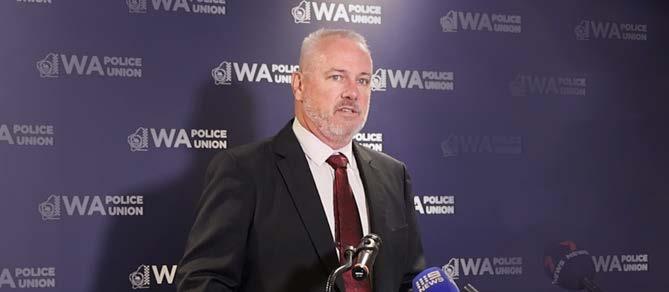
As we progress through the year, I want to take this opportunity to reflect on the significant developments and advocacy efforts that have shaped our work at the Union. Our achievements are the result of the collective determination of our Members, and the strength of our Unionʼs commitment to putting you first. From industrial wins and national advocacy, to improved welfare outcomes and Member engagement, we have made meaningful progress in several key areas.
Earlier this year, I raised a critical issue at a WAPU Executive meeting, urging a more compassionate and common-sense approach to disciplinary actions involving Members affected by mental health challenges. I want to commend the WA Police Executive for their willingness to embrace this empathetic mindset.
In one notable case, a Member who made a poor decision due to mental health struggles received a fairer and more thoughtful outcome. This marks an important cultural shift within the organisation. I will continue to advocate for mental health to be a core consideration during the earliest stages of disciplinary assessments, ensuring that it is never treated as an afterthought.
Introduction of the Firearms Act 2024 and amendments to the Restraint Order Act concerning Violence Restraining Orders or Family Violence Restraining Orders now face immediate stand-downs- actions that are often based on untested evidence. This automatic suspension without due process undermines fundamental principles of fairness and justice.
While we understand the necessity of managing risk and protecting the community, WAPU firmly opposes punitive measures imposed solely on allegations. These policies risk unfairly penalising our Members before any formal finding or investigation has concluded. We are actively engaged in broader legal and policy discussions to advocate for procedural fairness and to prevent bureaucratic risk aversion from overriding Members’ rights.
While we understand the necessity of managing risk and protecting the community, WAPU firmly opposes punitive measures imposed solely on allegations. These policies risk unfairly penalising our Members before any formal finding or investigation has concluded.
Over several months, WAPU has worked extensively with WA Police and Government Sector Labour Relations to navigate the complex new requirements introduced by the Minimum Conditions of Employment Act.
The new framework has created a cumbersome process affecting both Members and Officers in Charge, requiring formal responses of requests to work on public holidays and balancing reasonable refusals with operational needs.
This administrative burden has posed significant challenges at the frontline. Thanks to persistent dialogue, feedback, and a dedicated joint workshop, we influenced revisions to internal guidance, helping to ease this burden.
Members have since received clearer communications through Member Alerts and WAPU newsletters. While the system remains imperfect, this progress improves transparency and reduces unnecessary strain.
The registration of the 2024 Sworn Police Officer Industrial Agreement earlier this year capped off a lengthy, detailed negotiation process.
Following registration, Members received their full back payments, including shift penalties and outstanding allowances, shortly after the agreement took effect. The agreement has now been implemented, and WAPU remains committed to supporting our Members throughout this process.
Planning for 2027 begins now!
At this point we've received nothing on this front. When will it be delivered?
Ahead of the Federal Election, I represented WAPU at the Police Federation of Australia meeting alongside union leaders nationwide. Together, we leveraged our political influence to bring key policing issues onto the national agenda.
We secured written commitments from the re-elected Prime Minister and Labor Government to include policing matters on the Police Ministers Forum agenda.
Key advocacy areas include salary sacrificing for mortgages, early access to superannuation, and establishing a national health “Blue Card.” While these initiatives remain works in progress, securing firm commitments from the Labor Government marks important progress for frontline officers across Australia.
In recent months, we’ve resolved numerous complex and sensitive Member issues, spanning welfare support, disciplinary outcomes, entitlements, and rostering challenges. I’ve also had the privilege to meet with Members face-toface across the state, including:
• Assisting branch officials at the State Traffic Branch AGM.
• Discussing local concerns with Supt Pears at the Wheatbelt District Office.
• Engaging with staff at Perth Watch House regarding their expired agreement.
• Meeting with Commissioned Officer Branch representatives following Board motions.
• Participating in education sessions hosted by our Field Officer, Gary Keenan.
Welfare remains central to WAPU’s mission. I have supported Members directly at stations and homes, advocated in management meetings, and responded to queries about entitlements, public holiday processes, and rostering decisions.
I also attended the Retired Police Officer Association (RPOA) pre-retirement event, encouraging Members to consider financial planning and post-service support. Our partnership with the RPOA continues to be a vital resource for Members.
Our long-standing partnership with P&N Bank was recently upgraded to Platinum Major Sponsorship level for a new two-year term. This reflects P&N’s strong commitment to WAPU Members and their families.
Senior Vice President Pete McGee and I met with CEO Andrew Hadley and the P&N Bank team to finalise the sponsorship.
As a result, Members now have access to a

As a result, Members now have access to a range of exclusive benefits, including:
• $3,000 CASHBACK on eligible home loans*
• AN ADDITIONAL 10 BASIS POINTS (0.10% p.a.) on all term deposits*
• 10% DISCOUNt on general insurance premiums (excluding travel insurance)*
• EASY CONNECTION TO A FINANCIAL PLANNER*
(Note: Offers are subject to change. Terms and conditions apply. Please refer to P&N Bank for full details).
For more details, please search “WAPU Member Offer Terms and Conditions – P&N Bank”. This partnership reinforces our commitment to enhancing the financial wellbeing of our Members, both on and off duty.

Being a police officer is already a demanding job, with long hours and unpredictable shifts. For young officers who are also parents, the pressure is even greater, especially when it comes to affording and accessing childcare. Irregular schedules, high costs, and limited flexible care options place a heavy burden on police families.
Childcare is costly for everyone, but young officers, often on entry-level salaries, struggle more than most. Full-time care in Australia can cost between $100 and $200 a day, making it a major expense, particularly for dual-police households or single parents. Early-career pay rarely keeps up with these costs, and traditional daycare rarely aligns with officers’ atypical hours.
Police work involves nights, weekends, and holidays—times when most childcare centres are closed. This forces many officers to rely on expensive alternatives such as 24-hour services, nannies, or help from family members.
Juggling multiple solutions adds stress and disrupts stability for both parents and children.
While subsidies like the Child Care Subsidy exist, they are often better suited to standard 9-to-5 workers.
Many law enforcement agencies also lack employer-sponsored childcare or onsite facilities, which means there is little practical support for officer parents.
In addition to financial and logistical stress, the emotional weight is significant. Law enforcement is already a high-pressure job. When combined with concerns about childcare, many officers face mental fatigue, guilt, and burnout. Missing key family moments because of work is a painful reality for many.
Several changes could ease this burden:
Partnerships between police departments and childcare providers could offer extended-hours care suited to shift work.
Some departments abroad offer employersponsored daycare. Adopting similar models could greatly help Australian police families
Government support should better reflect the irregular schedules of officers, with options for overnight and weekend care.
Police unions can push for systemic reforms and raise awareness of the unique childcare challenges their members face.
Shift pattern adjustments or job-sharing arrangements could offer parents greater balance.
Full-time care in Australia costs between
$100 –$200 p/day
For young officers often on entry-level salaries, struggle more than most.

When Officer Flavia first joined the Western Australia Police Force, their firstborn child was just six years old. Thankfully, the initial transition into policing was manageable.
The structured Monday-to-Friday schedule at the Academy allowed the family to maintain a relatively stable routine. But as Flavia advanced in the job and entered operational duties, the unpredictable nature of policing began to shift the balance at home.
The rotating rosters, night shifts, and weekend duties soon took a toll on the family dynamic. To support Flavia’s career and the increasing demands of shift work, Flavia’s partner made a life-changing decision to leave their long-standing career in hospitality. In an industry known for its long hours and inflexible schedules, continuing would have made childcare and home life nearly impossible to manage. Instead, they moved into a more stable Monday-to-Friday role to become the consistent presence the family needed.
For young police parents, the struggle to secure childcare while managing a demanding career is real and pressing. Without meaningful reform, the profession risks losing talented officers to burnout or family pressures.
Better childcare policies and workplace support can help officers thrive both on the job and at home.
Migrant officers not only bring rich life experiences, but a profound sense of service to the country that welcomed them.
Flavia is deeply grateful for a partner who not only supported their career but understood the emotional weight carried home after each shift. Being a first responder means dealing with high-stress situations, adrenaline crashes, and sometimes trauma – none of which switch off at the end of a shift. That pressure bleeds into family life. It means missing birthdays, school assemblies, weekend barbecues, public holidays, and the little firsts that make parenting so rich – first steps, first words – often experienced secondhand through a screen.
Recently, Flavia and their partner welcomed their second child, an event filled with joy but also an all-too-familiar reminder of the sleep-deprived grind of caring for a newborn. This time, however, there was an added burden: the skyrocketing cost of childcare. At $175 a day, and with unpredictable rosters, committing to fixed daycare enrolments became a logistical and financial challenge.
In one week alone, Flavia paid $530 for childcare – almost half of their take-home pay.
The constant tension between providing for the family, progressing in a demanding career, and making ends meet has sparked ongoing debates about moving to part-time work.
While moving to part-time might increase access to government benefits and ease the burden at home, it also risks stalling professional growth and reducing financial security.
Even with progress in workplace equality, Flavia notes that the weight of family caregiving still disproportionately falls on mothers. Career sacrifices, emotional labour, and logistical juggling often go unshared, despite the strides society has made.
“It takes a village” is a saying Flavia knows all too well. For some, that village includes grandparents, siblings, or extended family who can step in to help with school pickups, sick days, or a cooked meal. But for migrant officers like Flavia – those whose entire families remain overseas – there is no village nearby. Every challenge, from emergency babysitting to doctor visits, is managed without the cushion of family backup.
WA Police is proudly home to many Culturally and Linguistically Diverse officers. These Members reflect the evolving population of Western Australia. Migrant officers not only bring rich life experiences, but a profound sense of service to the country that welcomed them. They offer multilingual skills, cultural insight, and even new culinary flavours to station kitchens. But the decision to serve on the frontlines is especially courageous when it means doing so without the close-knit support networks others may take for granted.
Wouldn’t it be great if the Blue Family could be that village?


For any police officer – whether fresh out of the academy or years into the job – choosing between a metropolitan or regional posting is one of the biggest career decisions youʼll face. Itʼs a choice that can shape not only your professional development, but also your lifestyle, experiences, and even your wellbeing.
Some officers thrive in the fast-paced, highdensity environment of metro policing, where shifts are busy, the work is diverse, and the familiarity of home is just a short drive away.
Others, however, embrace the challenge and adventure of regional policing, where career growth is accelerated, experience is gained at an unmatched pace, and strong community bonds are forged.
Ultimately, the choice is personal – it depends on your lifestyle, ambitions, and willingness to step outside your comfort zone.
Why Metropolitan Policing. Might be for You.
For those who value proximity to family and friends, the ability to attend social events, and access to entertainment, metropolitan policing is the obvious choice. If you enjoy heading to the footy on the weekend, playing for your local sports club, or simply being in the thick of city life, a regional post might not align with your priorities.
Metro stations also offer structure, with clearly defined roles and more opportunities for specialisation. While the work is demanding, officers typically have a large team to rely on, spreading the workload across shifts and ensuring a broad range of experiences over time.
However, a metro posting also means working within a system where progression can be slower. With larger teams, it can take longer to gain exposure to certain roles or responsibilities.
For officers eager to learn quickly, metro work may not always provide the same handson experience that regional policing does.

If you’re looking for rapid career development and an experience that challenges you in every possible way, regional policing is the place to be.
Unlike in the city, where you might spend months easing into different responsibilities, in the regions, you’re thrown into the deep end from day one.
It’s a sink-or-swim environment – but those who swim come out stronger, sharper, and more prepared for anything the job throws at them.
In regional areas, you’ll handle a wide range of cases, from serious crimes to community disputes, often with fewer resources than metro officers.
You’ll need to think on your feet, problem solve in real time, and develop a level of independence and confidence that can take years to achieve in the city.
Many officers who start their careers in regional WA, report that they return to metro stations far more experienced, better equipped for leadership roles, and with an overall greater appreciation for the job.
If you're looking for rapid career development and an experience that challenges you in every possible way, regional policing is the place to be.
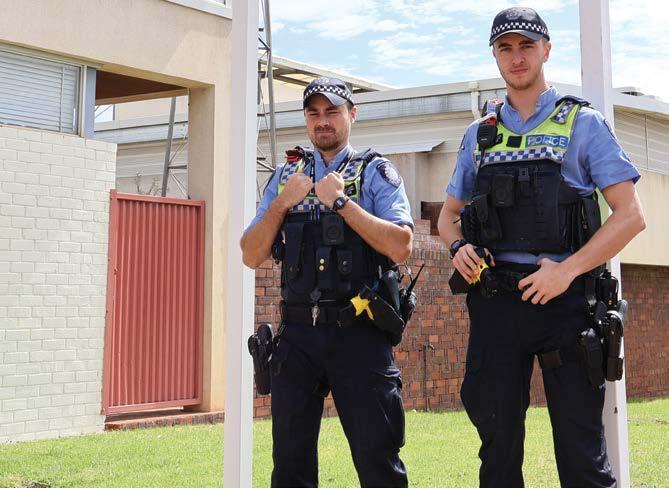
One of the biggest differences between metro and regional policing is the sense of community.
While metro officers may rotate shifts and interact with different teams, regional policing often fosters lifelong friendships and deep connections – not just with colleagues, but with the community itself.
As Constable Tiana Allen put it during a recent conversation, “Out here, you’re not just doing a job – you become part of people’s lives.” In smaller towns, officers become integral to the community.
Locals know their names, trust them, and rely on them. This can make the job incredibly rewarding, as the work you do has a direct and visible impact on the people around you.
iBefore making the leap to regional, experienced officers offer one crucial piece of advice: do your research.
Tiana also offered a simple, honest reflection: “The work is challenging, but it’s the culture that makes or breaks it – know what you’re walking into.”
1. Look into the area you’re considering
What are the crime trends? What’s the community like?
2. Find out who the Officer in Charge and Duty Officers are
Leadership plays a major role in job satisfaction, and a poor station culture can make a two-year posting feel like a lifetime.
3. Visit the station if possible Speak to officers currently stationed there to get a real feel for the work environment. Establishing these connections before deployment can make the transition much smoother.
Many officers who struggle in regional placements do so not because of the job itself, but because they didn’t take the time to assess whether a particular station was the right fit.

Is Regional Policing Right for You?
At the end of the day, regional policing isn’t for everyone – and that’s okay. Some officers prefer the structure and accessibility of metro work, while others seek the adventure and rapid learning curve of regional stations.
But if you’re someone who wants to accelerate your career, gain hands-on experience, and develop the skills that will make you a more capable, well-rounded officer, then regional policing is one of the best paths you can take.
Many officers who choose the regional route say the same thing: it’s tough, it’s intense, but it’s the best decision they ever made.
So, the question is – are you ready for the challenge?


The appointment of Hon. Reece Whitby MLA as Western Australiaʼs new Minister for Police, marks an important moment for the stateʼs law enforcement community – and particularly for the thousands of officers represented by the Western Australian Police Union (WAPU).
This is a pivotal opportunity for the new Minister to not only shape the future of policing in WA but also to set the tone for a genuine partnership with WAPU – a partnership that could deliver real, tangible outcomes for police officers on the ground.
At the heart of any conversation about policing in WA is one unavoidable truth: WA Police officers are the people who protect and serve every day, often in incredibly difficult and dangerous circumstances – and WAPU is their voice.
Minister Whitby: A Fresh Start, but with Big
Minister Whitby has already acknowledged the professionalism and dedication of WA Police officers. His words, referring to WA being “well served by a well-resourced and dedicated force,” are welcome – but words must now be followed by action.
Police in WA are facing immense pressure. Resourcing challenges, staffing shortages, mental health strain, increasing violence on the streets, and changes in the nature of crime all impact their ability to do their job safely and effectively.
For officers, it’s not about politics – it’s about real outcomes that make their daily working lives better and safer. And that is where WAPU must have a seat at the table.

This is a pivotal opportunity for the new Minister to not only shape the future of policing in WA, but also to set the tone for a genuine partnership with WAPU – a partnership that could deliver real, tangible outcomes for police officers on the ground.
For Minister Whitby to succeed in his new role – and for WA Police to thrive – working collaboratively and respectfully with WAPU is non-negotiable.
Police officers across WA are calling out for better resources. Whether it’s more boots on the ground, updated equipment, or enhanced training, WAPU is uniquely positioned to provide firsthand insight into where the gaps are and how they impact operational policing.
Policing comes with trauma. Officers face violence, tragedy, and stress daily. For many, this takes a heavy toll. WAPU has long championed better mental health support, early intervention programs, and recognition of Post Traumatic Stress Disorder as a workplace injury. Working closely with WAPU on these initiatives could change and save lives.
From violent assaults on officers to growing risks in regional areas, officer safety is paramount. WAPU’s push for tougher penalties for assaults on police, better protective equipment, and legislative safeguards must be part of any future policing agenda.
Enterprise bargaining is always a test of the government’s respect for police officers. Working constructively with WAPU during these negotiations will send a powerful message that WA values its police – not just in words, but in wages and conditions.
Recent firearms reforms in WA, described as the toughest in Australia – have sparked considerable public debate. But within the policing community, any major policy change impacts how officers operate.
Minister Whitby’s recent comments acknowledging community concerns show he understands the need to listen. That same principle must apply when working with WAPU on any policy that affects policing – whether that’s firearms laws, youth crime, family violence responses, or drug reform.
For frontline officers, this moment is about more than politics – it’s about trust, respect, and action.
Officers want a Minister who listens. A Minister who understands that the reality of policing can’t be fully grasped from behind a desk. A Minister who is willing to sit down with WAPU, not just when it’s convenient, but consistently, openly, and honestly.
WA Police officers want to know their concerns are heard – and more importantly – acted upon.
Minister Whitby now has a chance to set a new tone for the government’s relationship with WAPU and WA Police officers. That means:
Regular, structured meetings with WAPU leadership.
Transparent communication about government decisions.
Early engagement on legislation that impacts policing.
Genuine consultation on resourcing and operational challenges.
Respectful enterprise bargaining negotiations.
For the thousands of police officers who proudly wear the blue uniform in Western Australia, the next chapter under Minister Whitby is being written now.
But this chapter cannot be written without WAPU at the table.
Because when the government and WAPU work together – when the Minister listens, engages, and partners with the Union that represents WA Police – the entire state benefits. Stronger police. Safer communities.
A workforce that feels valued, supported, and respected.
That’s what’s at stake. And that’s why this partnership matters more than ever.


By sharing their stories, Rory and Nicole are turning their personal pain into public purpose. They know their careers are over. But if their voices spark a system overhaul, they will have created something even more lasting than a service medal... hope.

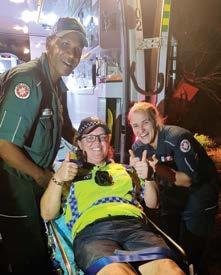

They faced danger on the streets. Now, they’re fighting a silent battle no one trained them for.
When we think of heroes, we often imagine sirens, uniforms, and split-second decisions. But sometimes, true heroism is quieter. It’s found in the raw honesty of those who share their pain— not to seek sympathy, but to protect others from the same fate.
Senior Constable Rory Anton and Sergeant Nicole Mizen were once celebrated for their service in the Western Australia Police Force. Today, they’re fighting another battle, one against a system that has turned its back on them.
And they are doing it not for themselves, but so that no officer after them suffers alone.
“I gave everything! Now I can’t walk properly.”
Sergeant Nicole Mizen gave 21 years to the force, serving the remote Pilbara community with heart and courage. Her strength wasn’t just physical, it was emotional, empathetic.
“I loved talking to people, hearing their stories, trying to point them in the right direction,” she remembers.
But no one pointed her in the right direction when her own body began to fail.
“I have 25% use of my right leg, 50% of my left, 65% of my spine and PTSD on top of that.”
Nicole, now 47, is unemployed, in pain, and uncertain about her future. But like Rory, she’s using her voice to call for reform.
“It’s not just about me. I’m speaking up because this shouldn’t happen to the next generation.”
Physically impaired
“I wasn’t the man my wife married.”
For Rory Anton, wearing the badge was a calling. He dedicated 14 years to the force—years filled with adrenaline, trauma, and the kind of memories that don’t fade with the uniform.
But the job didn’t just take a toll on his mind. It changed him.
“I fully admit I wasn't the person that my wife married,” Rory says quietly. “I don’t think I’d stay with someone who was as messed up as I was.”
The 38-year-old father of three now lives with post-traumatic stress disorder—a condition that affects not only his ability to work, but his ability to live.
The Process That Doesn’t Exist
The biggest roadblock? A missing person— literally. WA Police are required to appoint an independent legal assessor to evaluate claims for the PTI payment. But as of now, that role is still unfilled. The qualifications are so specific— like eight years of experience in a policing environment, it’s been dubbed “a unicorn hunt.”
“As soon as we employ this independent assessor, I think it will start to happen rapidly,” one official stated. But the weeks have turned to months and months into years. The system is paralysed. Meanwhile, Rory and Nicole, and likely dozens more, wait.
It takes bravery to chase an armed suspect. But it takes a different kind of courage to lay your soul bare before the public, to admit you're broken, to relive your pain, to expose a system that failed you.
Rory and Nicole are doing that. Not because they want attention. But because they want change.
“We swore to serve and protect,” Nicole says. “Now someone needs to protect us.” They aren’t asking for handouts. They’re asking for humanity.
His family has bared the weight. His career is gone. And the support promised by the state? Still out of reach.
Despite being declared medically unfit by the Police Commissioner, Rory cannot access the Permanent Total Incapacity (PTI) Payment, a financial lifeline meant for officers like him. Since its creation in 2021, not a single officer has been approved. Still, Rory is speaking out.
“There just has to be a better system,” he says. “Because this one just doesn’t work.”
Faster, fairer access to the PTI payment
Simplify the criteria and fill the assessor role with urgency.
A Veteran Affairs model for police: Police officers, like military personnel, often suffer long-term injuries and trauma. Their care should be comparable.
Holistic support post-retirement Mental health services, financial counselling, and family assistance are essential, not optional.
By sharing their stories, Rory and Nicole are turning their personal pain into public purpose. They know their careers are over. But if their voices spark a system overhaul, they will have created something even more lasting than a service medal…hope.
To those still on the frontlines, and to those who may one day find themselves in the same painful place, they say:
“You are not alone. And we’re fighting for you.”
What the latest CSS tells us about policing in WA

Each year, crime statistics stir debate across Western Australia – are things getting worse, or is it just public perception? Unfortunately, traditional offence rates don’t always give us the full picture.
A single theft is recorded the same as a homicide: both count as “1 offence”. But as any frontline officer knows, not all crimes are equal – in severity, impact, or the toll they take on those responding to them.
To fill this gap, WAPU has once again produced its own Crime Severity Score (CSS) for the 2023-24 financial year, building on five years of data and methodology. The CSS paints a more accurate, impactful picture of crime across WA by weighting offences based on the likely punishment handed down by the courts – and, by extension, the impact on police resources and Member wellbeing.
This year's findings are more than just statistics. They reveal the growing pressure on Members, particularly in regional WA, where violent crime is rising sharply, and workloads are intensifying.
WAPU began using the UK Office for National Statistics’ CSS model in 2019 as an alternative to relying solely on offence counts. In simple terms, the CSS translates the harm caused by crime into a single figure: custodial days. Offences are weighted based on sentencing outcomes –including imprisonment, community service, and fines – using ABS court data over five years to smooth fluctuations and reflect judicial standards.
These offence weights are then applied to WA Police crime data and scaled against population to give a per-capita severity score for each district and the state as a whole.
The result? A clearer, more honest picture of the burden being placed on our Members – not just by how many crimes occur, but how serious they are.
One of the report’s starkest findings is that while WA’s total offence rate has increased by 14.5% since 2020-21, its CSS has risen by 16.7%. In other words, crime is not just becoming more frequent – it’s becoming more harmful.
Violent offences – including assault, sexual assault, and robbery – carry more than double the severity weight of property offences like theft or damage. Though they make up a smaller share of total offences, violent crimes account for the bulk of the rise in CSS, especially in regional WA. These are the types of offences that carry the heaviest operational and emotional toll on officers.
For the first time, WAPU introduced a new metric – Officer Crime Severity (OCS) – to measure the real-world impact of rising crime severity on individual Members.

OCS divides total crime severity (in custodial days) by the number of sworn operational officers. The result is troubling: since 2014-15, the average number of offences per officer has held steady, but the OCS has increased by 7.6%. In other words, our Members are facing more dangerous and complex incidents – without additional support or relief.
In 2023-24, a single sworn officer was exposed to 477 times the crime severity of the average Western Australian. That figure is up from 454 times in 201415 – a worrying increase of nearly 5%.
The disparity between metropolitan and regional policing continues to grow. Since 201415, the CSS in Perth and surrounding suburbs has declined slightly. But in regional WA, crime severity has exploded – up nearly 35%. In 201415, regional CSS was 28% higher than metro. In 2023-24, it was almost 85% higher.
The Kimberley stands out. Its CSS is now more than five times the state average and double the next highest district. Other regional hotspots like the Mid West-Gascoyne and Pilbara also posted double-digit increases in CSS over the past year.
These are not abstract figures. They reflect real incidents, real violence, and real pressure placed on Members operating in isolated, highrisk environments with fewer backup options.
Our
Members
deserve a system that not only counts crimes, but understands their
true cost.
To help unpack whether more serious offences are occurring – or whether we’re just seeing more of the same – WAPU also introduced the Average Crime Severity (ACS) measure. This divides total custodial days by total offences.
In 2023-24, the average offence in WA carried a weight of 66 custodial days – up from 60 in 2014-15. And once again, regional WA leads this trend: the ACS in the regions is now 18.5% higher than in metropolitan areas.

What this means for Members is simple: even in Districts with low offence counts, the crimes officers are dealing with are more severe, more traumatic, and more demanding
The Impact on Our Members. is Undeniable.
Regression analysis shows strong statistical links between rising ACS and key indicators of Member stress and wellbeing:
Assaults on police
Sick leave taken by sworn officers
Officer resignations
Auxiliary officer attrition
As crime severity increases, so too does the strain on Members. While WAPU continues to advocate for resourcing and reform, the CSS and ACS provide hard evidence to support what our Members have been saying for years: it’s not just that there’s more crime – it’s that the job itself is becoming more dangerous and emotionally taxing.
Until the WA Police Force begins publishing the WA Crime Harm Index annually, WAPU’s CSS remains the best available tool to understand the real impacts of crime on officers and communities.
The message from the 2023-24 report is clear: policing is getting tougher.
The CSS and ACS help us cut through the noise and make a compelling case for better staffing, training, and support – especially in regional WA where the burden is most acute.
Our Members deserve a system that not only counts crimes but understands their true cost. WAPU will continue fighting to ensure those costs are recognised – and addressed.
The WA Police Union (WAPU) is embarking on an exciting new journey to modernise the way we engage with Members, streamline operations, and enhance service delivery. With a substantial investment approved by the Board, we are transitioning to a new Microsoft Dynamics CRM, marking the most significant technology upgrade in WAPUʼs history.
For years, our existing system, Gestalt, has served as our primary database, mainly handling member billing. However, an extensive review revealed that simply upgrading the system would not be enough.
To bring WAPU into the modern digital era, we needed more than just an update – we required a complete transformation. This meant shifting from outdated, on-premise servers to a secure, cloud-based solution.

After consultations with other Australian Police Associations, Microsoft’s CRM emerged as the preferred choice. With successful implementations in NSW, PFA, and NT police unions, WAPU saw an opportunity to leverage existing best practices and engaged Beyond CRM, a specialist Queensland-based provider.
A scoping project worth $27,000 was approved, leading to the final decision to implement the new CRM.
This new CRM is more than just a database – it is a comprehensive, integrated system that will revolutionise how we manage and interact with member data. Here’s what you can expect:
The new platform will bring several functions together in one place, helping staff manage things like:
Member billing
Legal and IR case records
Communications
Website content
Tracking Member benefits
By streamlining these areas, we aim to reduce duplication, improve accuracy, and support more consistent service delivery.
2.
Moving away from physical servers will help modernise our systems. Cloud-based infrastructure offers better security, easier access for staff, and fewer technical limitations.
Over time, this should help us respond more efficiently and support Members with fewer delays.
1.
Members will gain access to an intuitive online portal where they can:
Update personal details (branch, rank, location, leave status, etc.).
Beneficiary
Submit IR or legal support requests.
Access exclusive benefits, including retail partnerships.
Book holiday homes in real time.

WAPU will be able to tailor communications to specific Member groups based on rank, location, and status. Additionally, integrated surveys and online voting tools will improve Member engagement.
We’ll also be able to track the value of our sponsorships more effectively, ensuring that retail partners like John Hughes, Fitness Passport and many others are delivering real, tangible benefits to our Members.
New recruit onboarding is set to become more streamlined with the planned introduction of barcode-based sign-ups, replacing manual forms. Once operational, this system will allow for quicker, more accurate Membership processing.
Recruits will also receive automated welcome emails outlining key benefits, direct debit setup, and Membership perks, while graduation reminders will help ensure a smooth transition to full Membership.
WAPU will be able to tailor communications to specific Member groups based on rank, location, and status. Additionally, integrated surveys and online voting tools will improve Member engagement.
This transformation is not just about today – it’s about ensuring WAPU stays ahead of technological advancements. As part of our long-term strategy, we will:
Regularly assess new technologies to prevent falling behind.
Explore AI-powered solutions, such as chatbots, to further enhance Member support.
Continue improving the CRM to best serve our Membersʼ evolving needs.
Change of this scale comes with disruption, but it’s a vital step forward. This is WAPU’s largest Board-approved project since our building renovation 13 years ago.
The transition will unfold over at least 15 months, beginning with data migration and stabilising billing systems. Memberfacing features will follow in later phases.
Over the coming months, WAPU will be working closely with internal teams and consulting targeted Member groups to help shape how the new CRM delivers real-world value.
We’ll be drawing on the expertise of our staff and representative insights to ensure the system reflects the needs of our diverse Membership.
Regular updates will be shared as key project milestones are reached. This is a significant step forward for WAPU, and we look forward to keeping you informed as we build a smarter, more connected future for our Union.
Stay tuned for updates as we embark on this journey together!
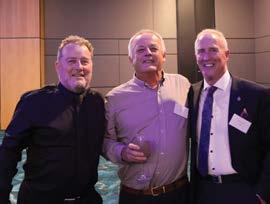

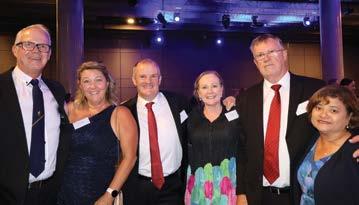

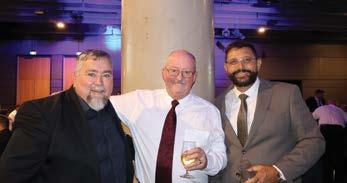

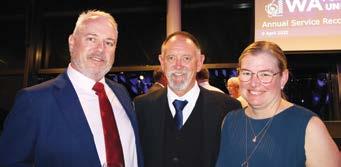

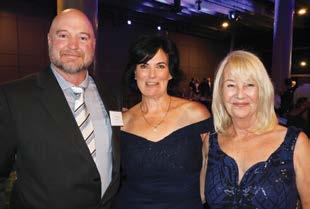
On Tuesday, 9 April, the WA Police Union had the honour of hosting the WA Police Retired Officers’ Recognition Dinner at Optus Stadium – a fitting venue for an event that paid tribute to a lifetime of service and commitment.
The evening brought together former officers from across the state, each of whom dedicated their careers to the safety and wellbeing of the Western Australian community.
The event served as both a celebration and a reflection – an opportunity to acknowledge the legacy of those who served and to recognise the profound impact they have had on the policing profession.
Guests were welcomed into an atmosphere of warmth and respect, where enduring friendships were rekindled and shared memories revisited.
The formal program featured a series of acknowledgements honouring individuals for their exemplary service, alongside heartfelt speeches that conveyed the deep appreciation held by the broader policing community.
The enduring bonds forged through shared duty were evident throughout the evening. Laughter, storytelling, and respectful remembrance filled the room, reminding all in attendance of the unique camaraderie that defines a life in policing.
To those who were formally recognised, we extend our sincere congratulations. To every retired officer, we offer our deepest gratitude for your dedication, professionalism, and service. Your legacy not only endures but continues to guide and inspire those who wear the uniform today.





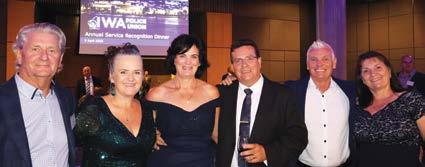



Over the past 18 months, the WA Police Union has completed a major facilities upgrade at our West Perth Headquarters, reducing electricity costs, future-proofing our building, and provide a more comfortable environment for staff and visiting Members.
This long-term project reflects WAPU’s commitment to sound financial management, operational efficiency, and sustainable asset planning.
In September 2023, energy consultancy Vista Energy was engaged to assess energy use across the building. The audit recommended four key upgrades aimed at improving performance and lowering overheads. These were:
• Roof insulation via Thermoshield coating
• Upgraded LED lighting
• Transition to a natural blended refrigerant
• Rooftop solar panel installation
Following the audit, the WAPU Board of Directors endorsed the proposed improvements, and implementation began in May 2024.
Thermoshield is a high-performance exterior coating applied to the roof of WAPU HQ. Specifically designed to reflect solar heat, it helps keep internal temperatures lower, reduces the strain on air conditioning, and contributes to long-term energy savings.
Vista Energy replaced 120 internal light fixtures with Australian-made LED lighting. These modern lights not only consume far less power than the previous fittings, but they also offer better illumination, enhancing both energy efficiency and workplace comfort. The longer lifespan of LED fixtures also reduces ongoing maintenance requirements.
Our existing chemical refrigerant for air conditioning was replaced with a natural blended one called “Engas”. Engas is a non-toxic refrigerant solution that does not contain any ozone depleting chemicals.

Collectively, these upgrades are projected to save the Union more than $22,000 annually in electricity costs.
The final stage of the project was completed in April 2025, when OffGrid WA installed 90 highefficiency solar panels on the WAPU HQ rooftop. With a combined generation capacity of 40 kilowatts, the system is expected to supply over 50% of the building’s annual electricity needs. The move to solar significantly reduces WAPU’s reliance on grid power and cushions against future increases in electricity prices.
Collectively, these upgrades are projected to save the Union more than $22,000 annually in electricity costs. More importantly, they support a smarter, future-focused approach to managing WAPU’s resources, ensuring our facilities remain efficient and cost-effective for years to come.
In today’s fast-paced world, attention is scarce, reputations are fragile, and trust is everything. Whether you're a union or a business, the challenge is the same: how do you show up in a way people understand, connect with, and believe in?
The answer lies in two often underestimated tools: branding and communication strategy.
These aren’t just marketing buzzwords –they’re essential leadership tools that define how people perceive your organisation and how clearly and consistently you communicate, both internally and externally.
As part of our commitment to strengthening our voice and connection with Members, our Union is currently undergoing a rebrand. This work is not just about updating our visual identity – it is about refining how we communicate, who we are, what we stand for, and how we work together to represent our Members.
Branding is more than a logo or colour palette. It’s the emotional and psychological relationship people have with your organisation. It reflects your values, personality, and identity. For unions, it’s about being seen as a credible voice for workers. For businesses, it’s about being more than just a provider of products or services.
Communication strategy is the intentional plan behind how you share information. It ensures your messaging is clear, consistent, and relevant – whether you’re speaking to staff, members, customers, or the broader public. Without a strategy, communication becomes reactive and fragmented. With it, you're better equipped to lead with purpose.
Unions and businesses may have different goals, but at their core, both are made up of people. People – whether employees, members, or the public – seek clarity, transparency, purpose, and connection.
Without a strong brand and clear communication, even the most capable organisation can struggle to build trust, maintain engagement, or create meaningful impact.
A clear brand identity and thoughtful communication bring internal alignment. When everyone knows what your organisation stands for, there's greater unity across leadership, teams, and departments. Purpose becomes more than words on a wall – it becomes part of how decisions are made and how people work together.
This alignment also builds culture. In unions, it fosters pride in membership and solidarity. In businesses, it enhances employee engagement and belonging. People feel more connected to their roles when they understand the bigger picture.
With a strategy in place, internal communication improves. It becomes easier to share updates, manage change, and respond to challenges. Importantly, it invites two-way conversation – ensuring feedback flows upward, not just down.
When people believe in the organisation’s mission, they naturally become advocates. They share stories and help reinforce the brand in the wider world.
Externally, branding and communication build trust. A clear, consistent message reassures people that you are reliable and credible – whether you're negotiating for workers or selling to customers.
It also helps you control your narrative. If you don’t tell your story, someone else will – and the version they tell may not be accurate. A proactive strategy ensures your voice is heard first and clearly, especially in crises.
A compelling brand makes it easier to attract new members, supporters, or partners. It shows people who you are and why they should care. This is especially important for reaching younger generations or more diverse audiences.
In crises, organisations with strong branding and communication weather the storm more effectively. People turn to the voices they trust. Clear, timely communication prevents confusion, reassures stakeholders, and protects reputation.
Finally, storytelling, the human side of branding, creates emotional connection. It turns facts into meaning and builds loyalty that lasts far beyond a single transaction or campaign.
Branding and communication strategy aren’t optional extras. They’re essential tools for leading well in today’s world. They drive clarity, build culture, foster trust, and ensure your story is heard the way it should be. WAPU will engage with Members during the initial phase of the project to ensure everyone is included in the journey and proud of the outcome.
If your organisation isn’t communicating intentionally, someone else will tell your story –and chances are, they won’t tell it as well as you can.


APPLICATIONS WILL ONLY BE ACCEPTED ON THIS FORM.
It can be emailed or posted to the Union office.
Complete and return by Friday 18 July 2025 to: WA Police Union 639 Murray Street, West Perth WA 6005 Email: admin@wapu.org.au
Results to be advised by Monday 28 July 2025
Name (Please Print): PD No:


Only mark the holiday periods and locations you are prepared to accept in numerical order of preference.
Note: Bookings are available from Saturday (2pm) to Saturday (10am) only. APRIL 2026
ALBANY
BUSSELTON VILLA 4
BUSSELTON VILLA 11
BUSSELTON VILLA 15
BUSSELTON VILLA 23 ESPERANCE

As the End of Financial Year (EOFY) approaches, it's the perfect time to take advantage of limited-time tax savings and exclusive vehicle specials through a Novated Lease with Paywise. Whether you're looking to upgrade your vehicle or start saving on tax, now is the time.
EOFY is the time when businesses and individuals wrap up their financial activities for the year, which runs from July 1 to June 30. This period offers unique opportunities for savings:
1. Exclusive Deals: Dealerships offer their best promotions and discounts during EOFY. These deals are often better than what you can get at other times of the year.
2. Pre-Tax Deductions: By starting early with pre-tax deductions, you can lower your taxable income for the current financial year, which means paying less tax.
3. More Tax Savings: Making smart purchases now can help you reduce your taxable income even more, leading to greater savings in the next financial year.
A Novated Lease is a smart way to finance your new vehicle and save on taxes. Here's how it works:
• Three-Way Agreement: A Novated Lease involves you, your employer, and Paywise. Your employer makes lease payments using your pre-tax salary, which reduces your taxable income.
• Tax Benefits: By lowering your taxable income, you pay less tax, keeping more money in your pocket.
• Cost Savings: You don't pay GST on the car's purchase price, and all running costs like fuel, registration, and maintenance are included in the lease.
Choosing Paywise for your Novated Lease means you get top-notch service and reliability. Here's why:
• Experience and Expertise: With over 35 years of industry experience, Paywise is your trusted partner in salary packaging and novated leasing solutions.
• Trust and Reliability: Join over 40,000 satisfied members who trust Paywise for their salary packaging and novated leasing needs.
• Member-Focused Service: You'll have a dedicated leasing consultant for the life of your lease, providing personalised service and support.
• Unparalleled Customer Service: Our support team is here to help with extended hours to fit your schedule.
With Paywise, our all-inclusive novated lease packages cover everything you need to keep your vehicle on the road. From the initial purchase to ongoing maintenance, we handle it all, making the process easy and stress-free.
As EOFY approaches, don't miss out on the chance to save money and get great deals. Whether you're upgrading your vehicle or optimising your tax strategy, Paywise is here to help. Contact us today to learn more about our novated lease solutions and experience the Paywise difference.











By Andrew Hadley, Managing Director and Chief Executive Officer at P&N
s P&N Bank is honoured to announce a new major platinum partnership that offers WAPU members even more enhanced personal banking, lending, and financial wellbeing benefits
Announcing the partnership at P&N’s Perth Headquarters in Kings Square, Managing Director and CEO Andrew Hadley said he was pleased to deepen what has been a pivotal relationship with WA’s Police Officers for over five decades.
“You may not know that P&N Bank began in 1969 when 10 WAPU councillors came together to establish the Western Australian Police Union Cooperative Credit Union Society Limited,” he said.
“Fast forward to 2025, while P&N Bank is now a contemporary bank for all Western Australians, we’re proud to continue our deep connection with WA Police Union members and acknowledge the important role that you play in protecting our communities.
Our new, first-of-its-kind platinum partnership with the WA Police Union, will see P&N Bank your preferred bank of choice with the benefits below designed to provide tailored, member-first solutions that support the unique needs of WAPU members.
Police & Nurses Limited (P&N Bank) ABN
The partnership will be led by our Chief Retail Banking Officer, Mark Smyth who has been an Executive with our organisation for three years and is a highly experience retail banking executive. New to this national retail role, Mark is looking forward to getting to know WAPU and their members as part of the partnership.
To make things as easy as possible for you, we have also employed a new relationship manager, Erica Clarke, whose role is dedicated to help WAPU members with your banking needs. You’ll hear from Erica when she commences with us in mid-June.”
Through this continued partnership, WAPU Members will continue to enjoy exclusive benefits, including:
• $3,000 cash back on eligible home loans*
• An additional 10 basis points (0.10% p.a.) on all Term Deposits*
• A 10% discount on general insurance premiums (excluding Travel insurance)*
• Easy connection to a financial planner*
Learn more at pnbank.com.au/wapu
Until Erica commences in mid-June, please direct any enquiries to Jessica Nguyen at Jessica.Nguyen@pnbank. com.au or on 0428 800 661 who will be able to assist.
On behalf of the Police & Nurses Limited Board of Directors, our leaders, and people, we look forward to being of service to WAPU members through this new partnership and would like to thank David Flaherty and WAPU for this opportunity.
*View P&N Bank WAPU Member Offer Terms and Conditions for full eligibility details available at pnbank.com.au/wapu
Complimentary initial 30-minute chat about your legal issue & a 10% fee discount for WAPU members, their families and retired members.
Complimentary initial 30-minute chat about your legal issue & a 10% fee discount for WAPU members, their families and retired members.
Leading Australian law firm, Tindall Gask Bentley is the legal services provider for members of the WA Police Union.
Leading Australian law firm, Tindall Gask Bentley is the legal services provider for members of the WA Police Union.
CRIMINAL & DISCIPLINARY
CRIMINAL & DISCIPLINARY
• The Corruption and Crime Commission

To arrange a preliminary in-person or phone appointment contact us on (08) 9211 5800
To arrange a preliminary in-person or phone appointment contact us on (08) 9211 5800
PERSONAL INJURY
PERSONAL INJURY
• Road accident compensation
• The Corruption and Crime Commission
• Courts of Inquiry
• Courts of Inquiry
• Criminal and disciplinary matters
• Criminal and disciplinary matters






FAMILY & DIVORCE
FAMILY & DIVORCE
• Children’s issues
• Children’s issues
• Child support matters
• Child support matters
• Property settlements
• Property settlements
• “Pre-nuptial” style agreements
• “Pre-nuptial” style agreements





• Road accident compensation
• Medical retirement
• Medical retirement
• Negligence and breach of duty of care claims
• Negligence and breach of duty of care claims
• Criminal Injuries Compensation
• Criminal Injuries Compensation






WILLS & ESTATES
WILLS & ESTATES
• Wills and Testamentary Trusts
• Wills and Testamentary Trusts
• Enduring Powers of Attorney
• Enduring Guardians
• Enduring Powers of Attorney
• Enduring Guardians
• Advice to executors of deceased estates
• Obtaining Grants of Probate
• Advice to executors of deceased estates
• Obtaining Grants of Probate
• Estate disputes
• Estate disputes
• Death Benefit claims
• Death Benefit claims




(08) 9211 5800 | tgb.com.au
(08) 9211 5800 | tgb.com.au
If youʼve suffered a physical or psychological injury as a result of a violent crime in Western Australia, you may be entitled to financial assistance through the stateʼs Criminal Injuries Compensation Scheme. The process can feel daunting – but understanding your rights is the first step toward healing.
The scheme is designed to support victims of crime who have experienced harm due to offences such as assault, sexual assault, domestic violence, or robbery. It offers compensation for things like medical expenses, psychological treatment, lost income, and other costs related to your recovery. Importantly, this is considered a last resort. You must first pursue other compensation avenues –such as motor vehicle accident or workers’ compensation claims.
Only if those are unavailable or unsuccessful should a criminal injuries claim be lodged
To be eligible, you must:
• Have suffered a physical or psychological injury due to a criminal offence;
• Be diagnosed by a medical professional;
• Lodge your application within three years of the incident (extensions are possible, but you must apply before the time limit expires).
You don’t have to be the direct victim – witnesses, first responders, or those indirectly affected may also be eligible in certain cases.
You can claim compensation for:
• Physical injuries such as broken bones, burns, or head trauma.
• Psychological injuries including PTSD, anxiety, and depression.
• Lost earnings, including unpaid overtime, shift penalties, or allowances not covered by standard sick leave. If your employer (e.g., WAPOL) has paid your work-related sick leave, these payments will be deducted from your total compensation, but you may still claim for other unpaid components.
• Medical and rehabilitation expenses, including the cost of reports and appointments.
• Travel costs associated with treatment.
If your employer has covered your medical expenses or paid you sick leave, those amounts will be deducted from your total entitlement (currently capped at $75,000 for offences occurring since January 2004). For example, if $6,000 in medical costs and $3,000 in sick leave have been paid, your maximum available compensation would reduce to $66,000.
Compensation depends on the severity of your injury, your psychological suffering, and financial impact. All claims are assessed on a case-by-case basis, and while some victims may receive the full cap, others may be eligible for smaller amounts.
Importantly, you must wait for criminal proceedings to be finalised before lodging a claim. This means the perpetrator must have been convicted of an offence linked to your injuries before you can lodge a claim. Once that’s done, claims can be lodged through WA’s eCourts portal. You’ll need to gather key documents including:
• Medical reports
• Police statements
• Victim Impact Statements
• Proof of income loss or treatment expenses
If your injuries are relatively minor and you haven’t taken time off work, you may be able to lodge the claim yourself. But if your case involves extended treatment, psychological trauma, or non-traditional circumstances (such as being an indirect victim), seeking legal advice is a wise move.
Yes. Claims may be denied if:
• There’s no formal diagnosis of injury;
• The injury cannot be clearly linked to the offence;
• The evidence is insufficient;
• The applicant was involved in criminal activity themselves or provoked the offence; or
• The application is submitted after the time limit without a valid reason.
If this happens, you have 21 days to appeal the decision, and it’s essential to get legal advice promptly to assess your options.
At TGB Lawyers, we’ve helped countless clients navigate the Criminal Injuries Compensation process. Whether you’re unsure about eligibility or need support preparing a strong application, we’re here to help.
We have created a detailed Q&A Guide to Criminal Injuries Compensation Claims which can be found on the member portal of the WAPU website: https://rb.gy/rm2etp. Book a free, no-obligation consultation to find out more.
Call us on (08) 9211 5800


























Joseph Watts
Lance Munckton
Lance Martin
Robert Duffey
Roger Beer
Lee Watson
Robert Traill-Nash
Michael Holden
Glen Willers
Adrian Baker
George Diamond
Caroline Keating
Aaron Abdullah
Stephen Holmes
Terri-Ann Bulley
Alexander Cufre
JANE KORCULANIC Senior
4229
DOUGLAS MEWS Sergeant Aged 76
DOD 16/5/2025
3400
FRANCES DODD
First Class Constable Aged 84
DOD 24/4/2025 8114
DARON HARVEY
Senior Constable Aged 60
DOD 30/4/2025
4586
COLYN ROWE
First Class Sergeant Aged 74
DOD 15/4/2025
4644
JEFFREY DUCKETT
First Class Sergeant Aged 73
DOD 3/2/2025
Tanya Tidey
Shannon Walker
Rachael Macey
David
Sean

4009
ROBIN LANGFORD Superintendent Aged 78
DOD 19/3/2025 3146 JOHN OVERSBY Superintendent Aged 88
DOD 9/3/2025 3754
LLOYD KERFERD Inspector Aged 80
DOD 12/3/2025
Brandon
Johnathan Cavalier Maria
Benjamin
Tim Koop Ryan Velthuysen
Kellie Millier
Bishara Khader
Jayden Bandy
Leo Joubert
Roy Baird
Sarah Sparkes
Thomas Clozza
Samuel Hunt
Marjana Dragicevic
Morgan Beresford
Andrew Seaman Estefania Maughan




Brand new look and easier to navigate
Calm down and re - centre af ter high s tres s moment s
Take control of your long-term health and wellbeing
Monitor how you are going, mentally and physically
Call for help any time you need it
Introducing new feature, myShif t , to help manage your shif t schedule and improve your sleep

conads co/equipt
